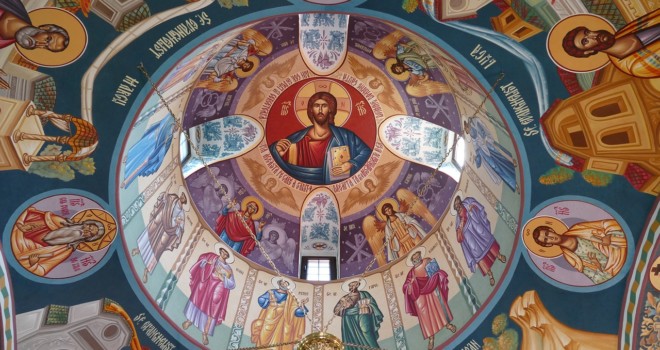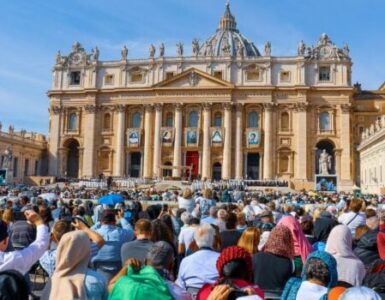BK does not stand
for Byzantine Catholic. It stands for Burger King. At Burger King, you can have
it your way. But not here.
We are a Church that makes bold to teach with
authority. Here, we cannot pick and choose what doctrine we will believe. The
word heresy comes from the Greek αἵρεσις, meaning “choice – a
taking or a choosing.” Picking and choosing what you believe according to your
tastes or inclinations or according to what makes sense to you at the time is
heresy and we condemn heresy in the Church.
If we would consider ourselves members of the
Church, we must listen to the Church with humility and not run off to hear
whatever ideas tickle our ears (2 Tim 4:3). We must believe the teaching of the
Church even more than our own ideas. This is hard for individualist Americans
to hear.
Some people treat their membership in the Church as a birthright.
Membership in the Church is not a birthright. I mean to say, for example, you
are not a Byzantine Catholic solely as a result of who your parents are,
even though they very often have something to do with it.
At your initiation into the Church, you are required to profess
the faith expressed in the Nicene Creed, given to us by the first two
ecumenical councils. If you are a baby, your godparents must profess the faith
for you. By so doing, they take on the solemn task of doing all they can to
raise you as a believer. If they fail in that task and you do not believe, then
you do not belong to the Church, which is the body of Christ. It is those who believe
that will live in Christ.
Some people think they belong to the Church by virtue of
attendance alone (or even by virtue of donations alone!). Even coming to church every Sunday of your life
does not make you a member of the Church, if you do not believe the faith we
profess. Don’t get me wrong; it’s necessary to show up and all are welcome, but
becoming and remaining a member of the body of Christ requires giving him your
heart, mind, and soul and not merely your butt in the seat.
To belong to Christ, to be a member of his
body, the Church, you must profess the true faith and condemn the heresies,
which deny this or that aspect of the faith. Every heresy contains a
half-truth, overemphasized to the expense of another truth. Every heresy
attempts to make human sense of the divine mystery, and to subject God to human
reason. This is grievous disrespect of God. The heretic has no fear of God.
The first six ecumenical councils, which we
commemorate on this Sunday, worked always to preserve the mystery against
heresy and to proclaim the revealed saving truths we know as dogmas. A dogma is
not some odious thing. It is the truth of our salvation revealed to us by God.
Dogmas set us free. These saving dogmas are expressed preeminently in the
Nicene Creed, which we profess at every Divine Liturgy.
The term “dogmatic” in our culture has come to
mean someone who is overly rigid and thinks they know more than do. “Don’t be
so dogmatic,” we hear. “Be more open minded.” But as G.K Chesterton observed,
“The object of opening the mind, as of opening the mouth, is to shut it again
on something solid.”
And he also said, “An open mind is really a mark of foolishness, like an open mouth. Mouths and minds were made to shut; they were made to open only in order to shut.”
I would add that, as with the mouth, it’s
important to be able to open your mind repeatedly, lest you starve to
death, but it’s just as important to then close it again repeatedly.
And I will say this: It really is true that
there are many Christians who think they know more than they do. Not every idea
that pops into our Christian heads is a dogma. Not every question has an answer
that has been revealed to us by God. It is a common error to regard a widely
held opinion to be a dogma. We know less than we tend to think we do.
Why God does not want us to know everything, I do not know, but he does not. He wants us to know him (John 17:3), not necessarily to know things — or even everything about him. He gives us the things we do need to know about him and we can trust that what he has given us is sufficient without thinking we have to have all the answers.
We remain ignorant of many things, and, as the free children of God, we are free to have opinions about these things. There’s nothing wrong with having opinions so long as we hold them as opinions and not as dogmas — and so long as they do not go against the dogmas. We should hold our opinions lightly and adhere to the saving dogmas fiercely. Be ready to die for the latter, but not so much the former. We may keep our opinions at least until God shows us that the truth is otherwise than we thought. Our minds must be malleable in God’s hands, but not in the hands of just anyone.
We can and we must hold fast to what has been revealed to us. To dogma. To the creed — the symbol of faith.
But how can we trust this statement of belief,
though? There are some Protestants who reject all creeds or say things like,
“the Bible is my creed.” How do we know who to believe?
Well, let’s go back to the source — to the Lord. Jesus has authority from his Father over all flesh (John 17:2). And he says, “I have given to [the apostles] the words which [the Father has] given me; and they have received them” (John 17:8). How can we receive these same words? The words spoken with authority. The words we know to be true because they are from God, who is Truth himself. They were given to the apostles and so it is through the apostles that we receive them.
We call this the apostolic tradition. Traditio
means “to hand over” or “to pass down.” The apostles received the words of the
Father from Jesus himself and they have passed them down to us under the
protection and by the guidance of the Holy Spirit. The Bible is, indeed, one of
the best ways they have done this for us, but it is not the only way.
They also passed on their apostolic authority
to the bishops, who always have the authority to teach the faith and to preserve
the apostolic tradition. This tradition, which, remember, is the words of the
Father given to the apostles by Jesus Christ and passed down to us, is best
expressed when the bishops gather together in council and speak with one voice.
When all the Church receives their teaching, we call this an ecumenical
council. The saving and life-giving dogmas these councils express for us are
worthy of our belief. Therefore, at every Divine Liturgy and also at Compline,
we profess the creed they have given us. Listen carefully
to the words. Ponder them in your hearts. These are words given to us by God.










